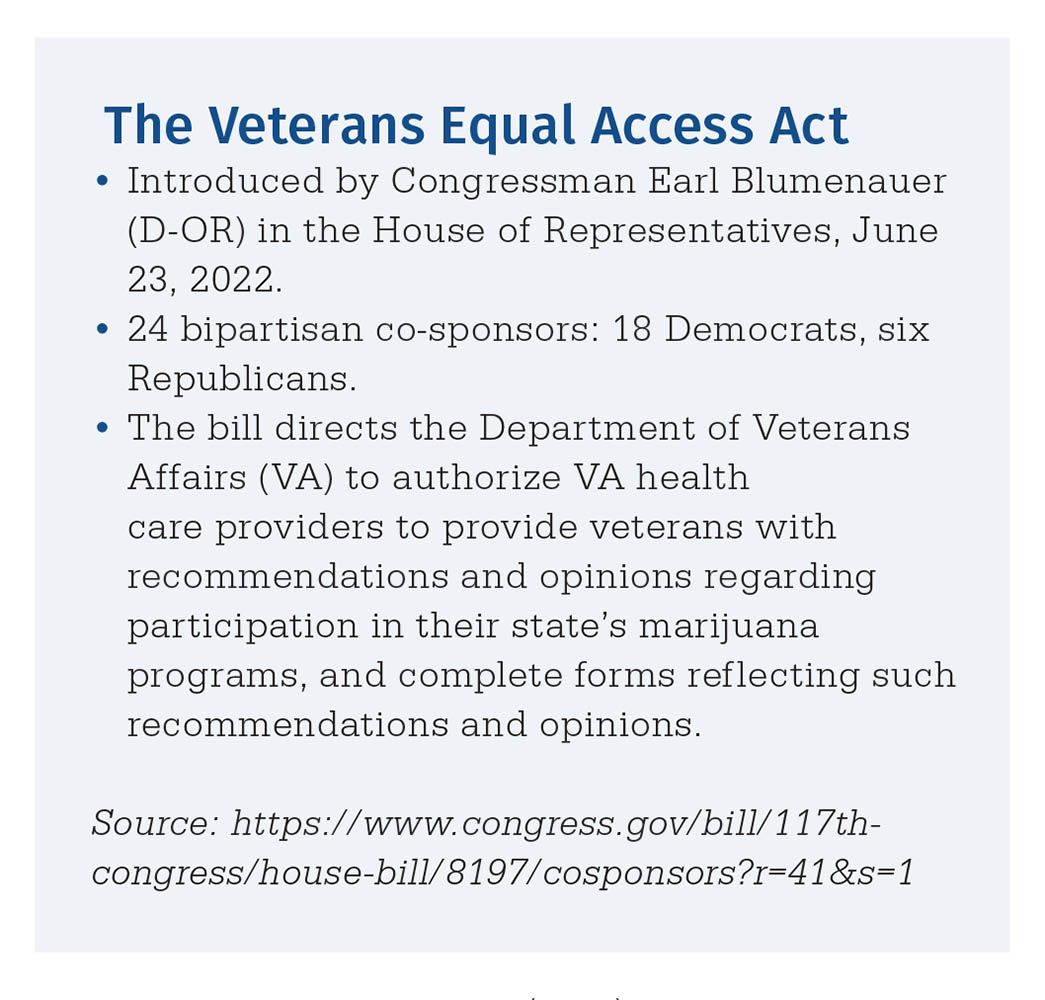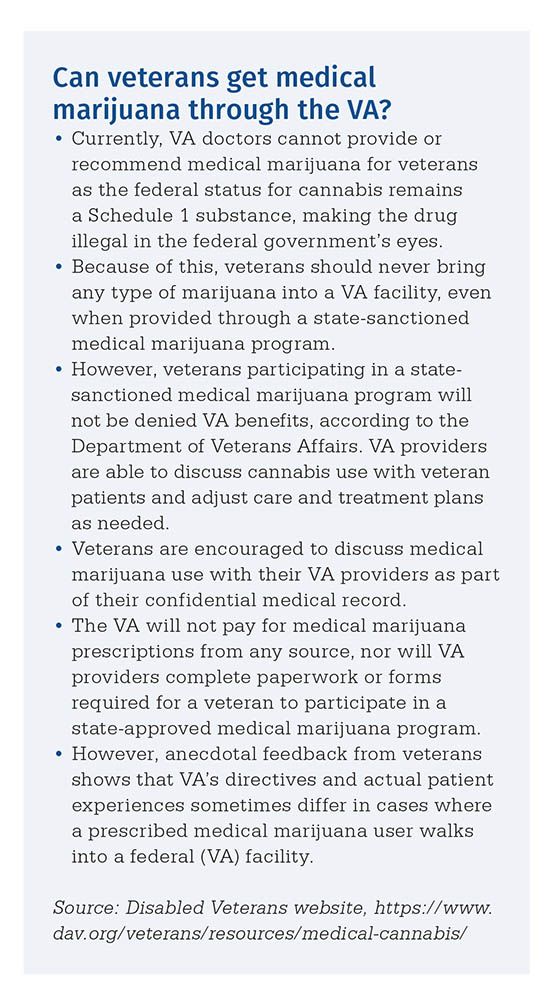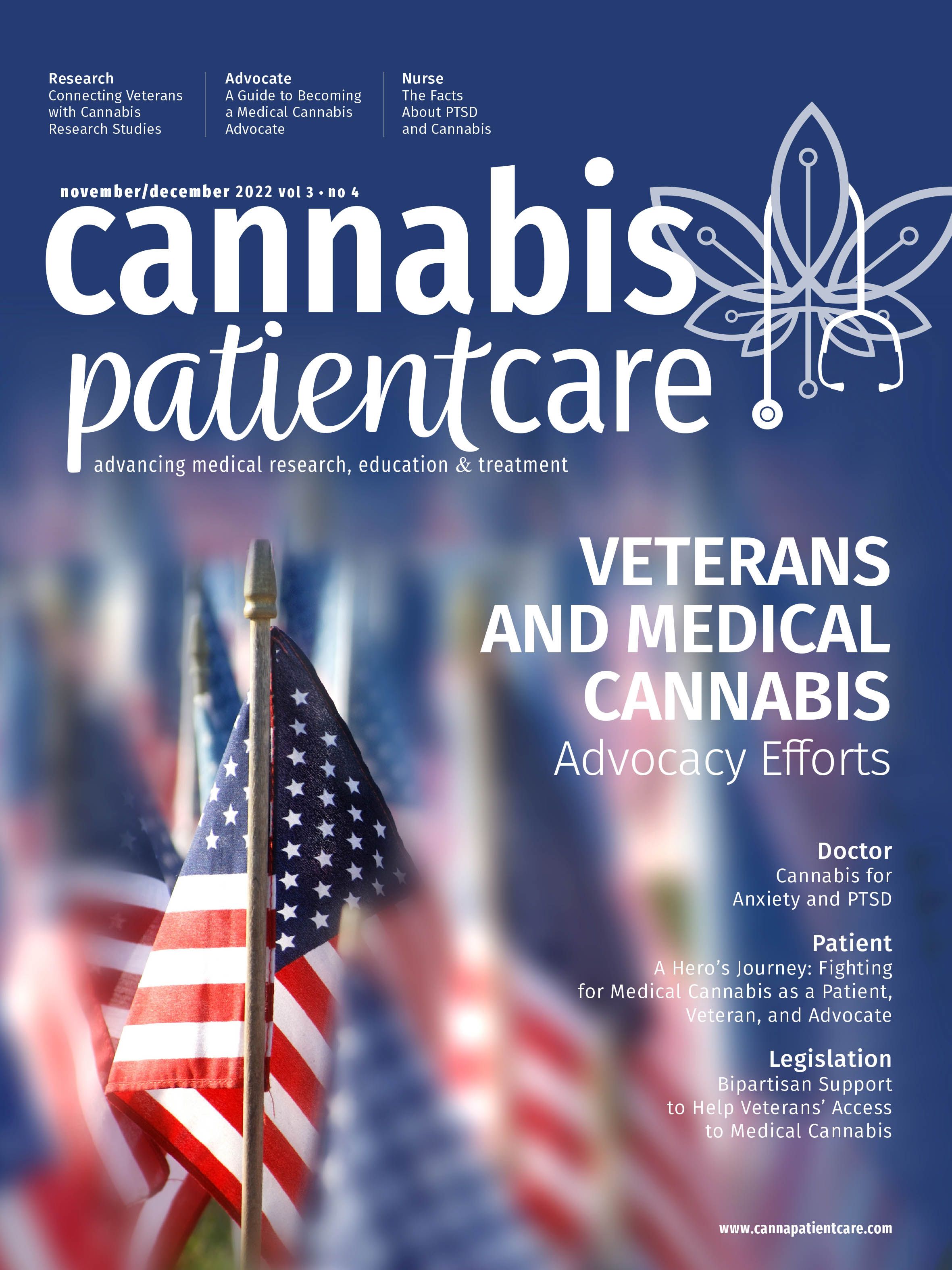Bipartisan Support Steps in to Help Veterans’ Access to Medical Cannabis
For years, Congress and various veterans' advocates have been working to get Veterans Affairs to drop the obstacles blocking medical cannabis use for veterans. Now real progress is at hand and we speak with Congressman Earl Blumenauer on the work he’s been doing as well as updates on the current state of legislation related to veteran access to medical cannabis.
There has been a steady call within Congress to do the right thing for veterans suffering mental health and chronic pain issues as they cycle back into civilian life. Most are dealing with a combination of things about adjusting to life back at home after experiencing the horrors of war in Afghanistan, Iraq, or another world hotspot where they are deployed. When home, it’s about adjusting to a new normal. That doesn’t happen at the snap of a finger, especially as they have to carry around with them the physical and emotional damage that nearly every warfighter has to live with.
About 11–20% of veterans from Operations Iraqi Freedom (OIF) and Enduring Freedom (OEF) have returned home with post-traumatic stress disorder (PTSD), according to the US Department of Veteran Affairs (VA) (1). About 12 out of every 100 Gulf War Veterans have PTSD in a given year. When they seek help from the VA hospital, it usually comes in the form of an opioid cocktail of some kind, which is the generally accepted treatment regimen. That, along with some counseling, is about all they can get. And that can lead to more problems, such as addiction to the opioids that can cause ongoing suicidal ideation, or lead to a deeper internal psychosis, as they try to work through all the bad memories from
their deployment.
Some veterans discovered on their own that cannabis can help them. But soldiers follow orders. Using an illegal drug like cannabis flies in the face of all they have been taught as patriots trained to uphold the rule of law.
So, they are left to suffer within a broken health system. They sometimes act on their thoughts of suicide—there were more than 6000 veteran suicides in 2020 alone (2). Or they simply give up on trying to get back into the life they left, and slowly fade into a deep, dark hole of depression.
Cannabis Can Help
In April 2016, the US Drug Enforcement Administration (DEA) approved a clinical trial (3) for medical marijuana treatment for veterans, which was the first ever randomized controlled trial of whole plant medical marijuana for the treatment of PTSD in US veterans. It was also the first time that a clinical trial intended to develop marijuana into a legal drug that had received full approval from US regulatory agencies. Since then, there have been multiple clinical trials of cannabis to treat PTSD for veterans.
Current studies include another clinical trial in the recruitment stage to study the functional outcomes of cannabis use (FOCUS) in veterans with PTSD (4). The investigators will evaluate the relationship between cannabis use and daily functioning among cannabis users and heavy cannabis users.
Clinical trial researchers noted that emerging observational and early clinical evidence suggest that cannabis may have the potential to reduce or ameliorate a number of symptoms experienced by those with PTSD, including sleep difficulty and anxiety (5). Indeed, some evidence has suggested that delta-9-tetrahydrocannabinol (THC) may serve to reduce nightmares among those with PTSD, while other studies have shown the positive effects of cannabidiol (CBD) for PTSD.
Congress and Veterans for Marijuana

Legitimizing cannabis for veterans has had its true champions in Congress over the years. There have been a handful of bills written and discussed in Congress related to veterans and cannabis for treatment of PTSD and chronic pain: the VA Medicinal Cannabis Research Act of 2018, reintroduced in 2021 (6); the Veterans Medical Marijuana Safe Harbor Act, introduced in April 2021 (7); the VA Medicinal Cannabis Research Act of 2021, introduced April 29, 2021; and the Veterans Equal Access Act, introduced in Congress in March 2017 after a different version of it appeared in 2015 (8). It was subsequently reintroduced in August 2022. Congressman Earl Blumenauer, founder and co-chair of the Congressional Cannabis Caucus, has been a key Congress member actively pushing for discussion and votes on these veteran's bills all along.
Blumenauer’s advocacy for cannabis for veterans dates back to 2011, when he wrote a book about it called The Path Forward (9). In his book, he wrote about the directive from the VA called the “Access to Clinical Programs for Veterans Participating in State-Approved Marijuana Programs.” This directive specifically prohibited VA medical providers from completing patient forms looking for recommendations or opinions about participating in state marijuana programs. Under this directive, if a veteran wanted to use medical marijuana in a state where it is legal, they would have to get it illegally at their own expense or find a separate recommendation from a doctor outside of the VA.
Blumenauer said that he is very optimistic about the most recent version of his Veterans Equal Access bill gaining serious traction in this Congress during the end-of-2022 lame duck session. “It’s been a long slog,” he said. “We’ve been working on this forever. It is something that is overwhelmingly supported by the public. We’ve heard from veterans and their families about their stories about how medical cannabis has changed their lives.”
He said that there was an extensive study just released that revealed that, where people have used medical cannabis, there has been a dramatic reduction in use of opioids. “This was a study that included thousands of people,” said Blumenauer. “Now, all of this stuff is coming together.”
He said that there are “lots of moving parts,” but one piece that is solid is how much support there is. “In terms of medical cannabis, the public support is like the Fourth of July. It’s just overwhelming. And I’ve had numerous conversations as we come into the homestretch here, post-election, lame duck, where the support is as strong if not stronger than ever,” he said. “The research is there to back it up. And I think that this is finally an idea whose time has come.”
The Mast Influence
Blumenauer confirmed the significance of Congressman Brian Mast (R-FL) (10) signing on as co-sponsor of his bill. Mast is a disabled Afghanistan conflict veteran. “Congressman Mast is a very eloquent spokesperson. He’s living testimony,” Blumenauer said. “And this illustrates the broad bipartisan support (for the bill). This was never a partisan issue. I appreciate his engagement.”
Blumenauer said that he has been working on the bill for years and always had Republican interests. “We’ve worked hard with the Cannabis Caucus, working to make sure that there was engagement with people across the aisle. We’ve reached a point now where surveys show not only is there an overwhelming support in the general public, but now we’ve reached the point where a majority of Republicans support it,” he said. “We’ve had some problems in the past with Republican Senate leadership. That has been problematic. But this Senate leadership now is probably behind cannabis reform. And we have strong Republican voices that care about this and I think this is the month that we get it across the finish line.”
Blumenauer recalled one discussion session at the Portland Veterans Administration Hospital, where they were talking about policies. “I was very clear that I supported changing the regulations so that the VA doctors know the veterans can consult with them,” he said. “And as I was leaving, one of the staff members of the PVA came up to me and whispered, ‘This is really important. Thank you,’” he said. “This bill is so overdue. Ultimately, we’re going to get it but I think this is the month that it might all come together.”
He talked about another one of his bills, which was recently signed by Biden—H.R. 8454, the “Medical Marijuana and Cannabidiol Research Expansion Act” (11). That bill establishes a new registration process for conducting research on marijuana, and for manufacturing marijuana products for research purposes and drug development. “I was very excited that that piece of legislation that I have been working on forever, which is the research legislation, was signed by the President,” he said. “This research element is going to be very, very important. Every workday in America, we have tens of thousands of people who fail an employment drug test. And again, nobody wants to have anybody who’s impaired on the job, with any equipment or anything else. But it’s not a function of their being impaired. It’s a function of not having a good test, so this legislation I think is going to clear the way for that.”
The Biden administration has done the most to legalize medical marijuana of any previous administration. In October 2022, President Biden announced three steps he was going to take to legalize cannabis, including pardoning of all prior Federal offenses of simple possession of marijuana; urging all state governors to do the same about state possession offenses; and asking the Secretary of Health and Human Services and the Attorney General to initiate the administrative process to review expeditiously how marijuana is scheduled under federal law and work toward rescheduling or descheduling it (12). “Too many lives have been upended because of our failed approach to marijuana. It’s time that we right these wrongs,” President Biden wrote in a statement released by the White House announcing the steps to legalization (12).
Time for an Advocacy Push

As it stands now, veterans suffering from PTSD or chronic pain issues still do not have clear access to marijuana through the VA. Now that there has been movement in Congress along these lines, and more clinical trial development to prove the efficacy of cannabis for PTSD, it’s time for more advocates to step up with their stories and get the VA to act.
To be sure, there are already many groups around the country where anyone can get involved in getting help for veterans seeking medical cannabis. One example (13) is the Veterans Cannabis Project, founded by a former US Navy Seal, which joined the US Cannabis Council (USCC) in February 2021. The Veterans Cannabis Project is an organization that represents a new alliance of top cannabis businesses, associations, and advocacy organizations working to end federal cannabis prohibition.
The USCC threw their support behind cannabis legislation introduced in November 2021, by Congresswoman Nancy Mace (R-SC), called “The States Reform Act” (14). That act would provide enhanced protections for military veterans against the loss of VA healthcare benefits and other discriminatory practices, and would fund mental health services for veterans, among other provisions.
Other veterans and marijuana advocacy organizations include Veterans for Medical Cannabis Access (15); Weed for Warriors (16); Veterans Cannabis Coalition (17); Veterans Alliance for Holistic Alternatives (18); and the Balanced Veterans Network (19)—among many others.
One medical cannabis advocate with his own story about his tour in Iraq is veteran and attorney Brandon Wyatt. Wyatt suffered psychological damage in the war, coming home so traumatized by his experience that he was unable to speak (20). He eventually worked his way out of that problem, became a lawyer, and now works with veterans advocacy organizations, touring cities and presenting at educational forums. “That touring really allowed me to connect with a lot of folks across the country, and also work with a lot of politicians,” Wyatt said.
“I know that the VA is trying not to take certain steps, because the closer that we get to that process, the closer it triggers other systems,” he said. “You know if you can recommend it, if you can talk to your patient about it, then why is the government not paying for it, or for you to get it from the VA facility?”
Wyatt said that it’s not just veterans or disabled veterans who can be advocates for medical marijuana. “I think it can be anybody,” he said. “I think especially families of veterans, like the children of veterans who grew up in a military type of household. They have to be the leader of change for their father or mother to help them get in the door regarding PTSD or other issues, because, generationally, there’s a gap. There is an aversion for many veterans to try any medication. A lot of us (veterans) are strict rule followers. So, when it came about that this was the rule that the government was changing (about cannabis), and that it will be something that was considered medical, that didn’t trigger acceptance by all the veterans. But it triggered a lot of their families. And not just wives or daughters, but cousins, aunts, uncles, all who recognize the PTSD they were witnessing with their loved one.
“In this country, you can have the weapon of the mind, the weapon of community. It’s us being able to join minds and use our collective power as veterans to stand up for this particular issue,” said Wyatt.
References
- https://www.ptsd.va.gov/understand/common/common_veterans.asp
- https://www.va.gov/opa/speeches/2022/11_07_2022.asp
- https://maps.org/news/media/press-release-dea-approves-first-ever-trial-of-medical-marijuana-for-ptsd-in-veterans/
- https://clinicaltrials.gov/ct2/show/NCT04565028
- https://clinicaltrials.gov/ct2/show/NCT02759185
- https://www.congress.gov/bill/117th-congress/house-bill/2916
- https://www.congress.gov/bill/117th-congress/house-bill/2588/text
- https://www.govtrack.us/congress/bills/115/hr1820
- https://www.amazon.com/Path-Forward-Rethinking-Federal-Marijuana/dp/1503109771
- https://mast.house.gov
- https://www.congress.gov/bill/117th-congress/house-bill/8454/text
- https://www.whitehouse.gov/briefing-room/statements-releases/2022/10/06/statement-from-president-biden-on-marijuana-reform/
- https://www.vetscp.org/news
- https://www.congress.gov/bill/117th-congress/house-bill/5977/text
- http://www.veteransformedicalmarijuana.org
- https://www.wfwproject.org
- https://www.veteranscannacoalition.org
- https://www.vahahealth.com
- https://www.balancedveterans.com
- https://northernvirginiamag.com/health/medical-features/2017/02/07/retraining-the-returning-warrior-for-civilian-life/
About the Author
David Hodes has written for many cannabis publications, and organized or moderated sessions at national and international cannabis trade shows. He was voted the 2018 Journalist of the Year by Americans for Safe Access, the world’s largest medical cannabis advocacy organization.
